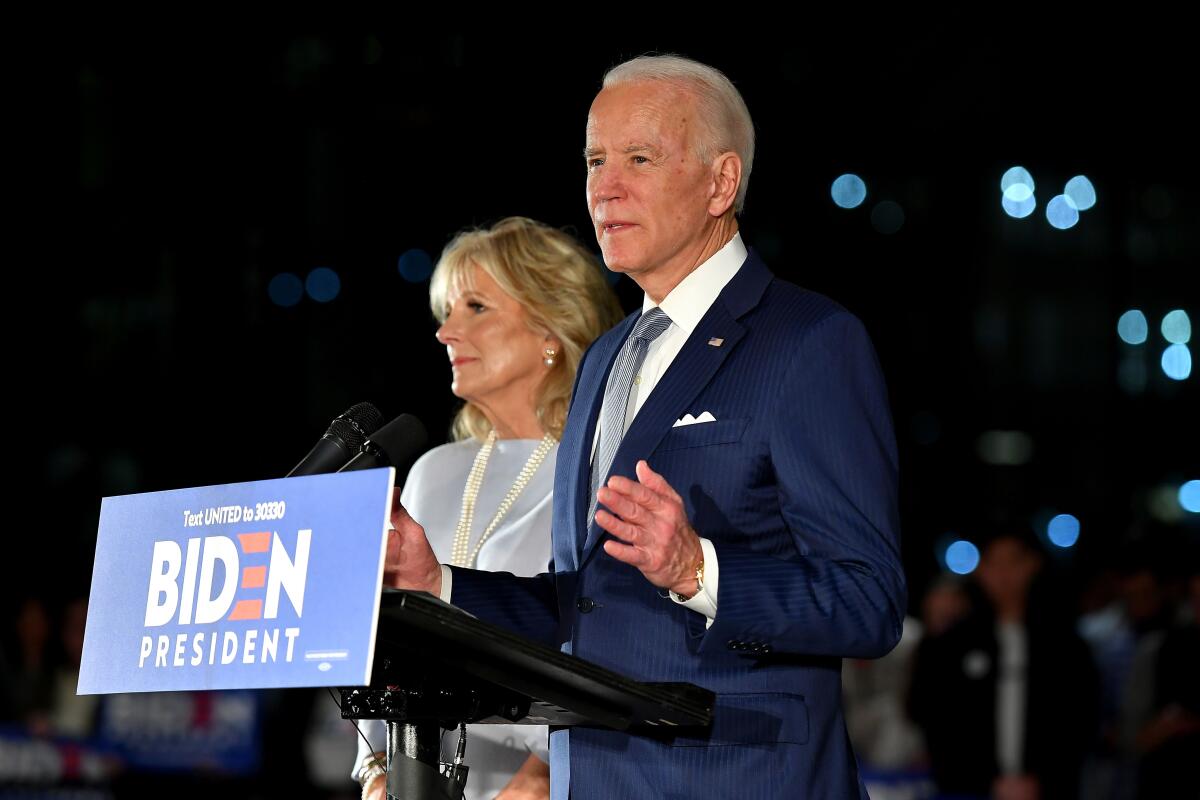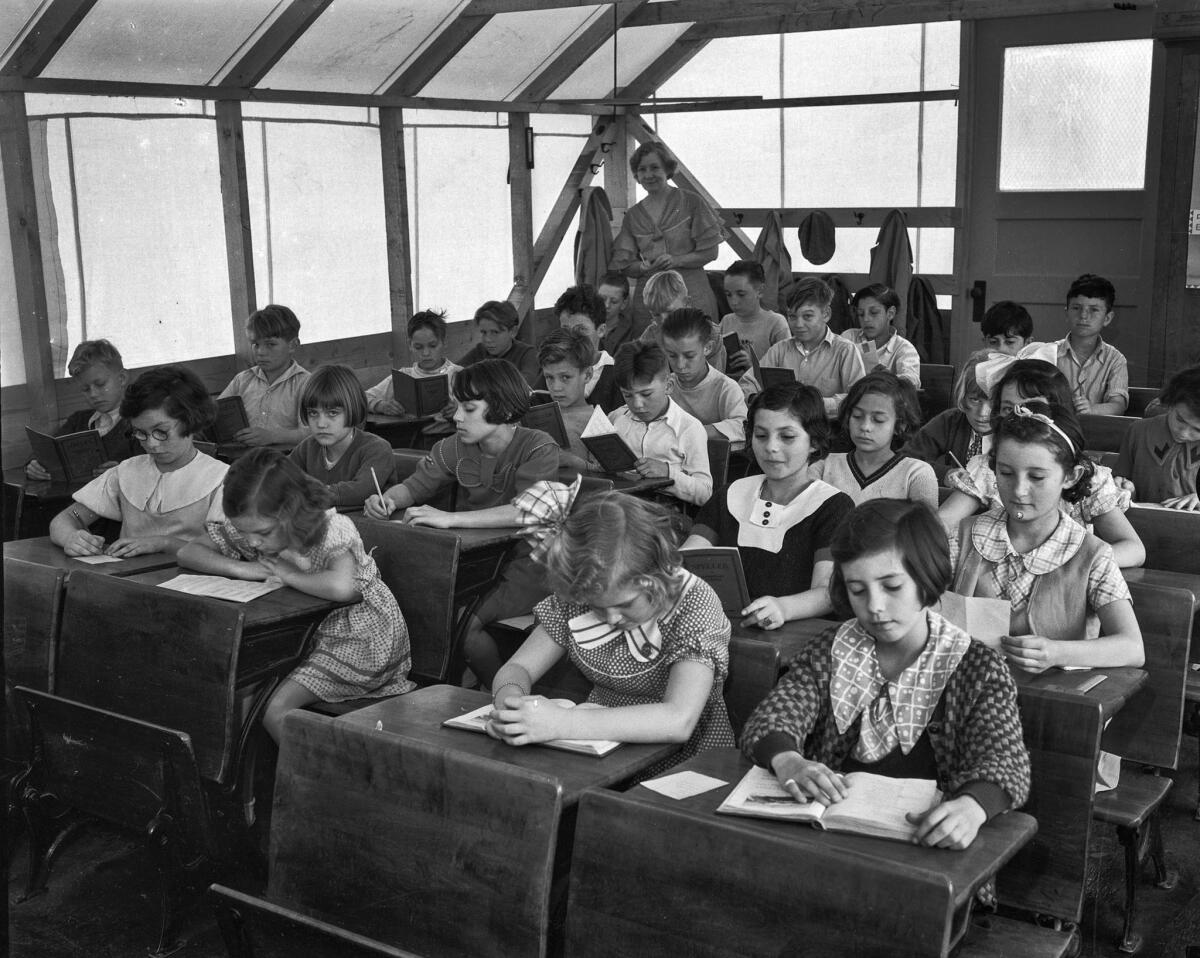Newsletter: Biden takes the Super Tuesday sequel

- Share via
After the latest round of voting in the Democratic presidential primary, Joe Biden is in command and Bernie Sanders is facing more calls to drop out.
TOP STORIES
Biden Takes the Super Tuesday Sequel
Is it time for Sen. Bernie Sanders to stand aside? After former Vice President Joe Biden won the Michigan primary and three other states, solidifying his status as the Democratic presidential front-runner, the odds of Sanders mounting a comeback have dropped — and the calls for party unity have grown.
Compounding the sting of Sanders’ bad night was that he had a decidedly lackluster showing in states that had once enthusiastically embraced him.
Though neither Biden nor Sanders held traditional post-election rallies because of coronavirus concerns, Biden gave a speech in Philadelphia thanking Sanders and his backers for “their tireless energy and passion” and sounding several notes seemingly aimed at winning their support. Sanders remained silent.
Some in the Democratic Party are suggesting that the senator from Vermont should call it quits. One congressman suggested last night that it was time to “shut this primary down,” starting with the cancellation of a two-man debate scheduled for Sunday in Phoenix. Already, it’s been decided to hold the debate without a live audience because of the coronavirus outbreak.
Changing Tactics in the COVID-19 Fight
With more than 1,000 confirmed cases of the new coronavirus in the U.S. and scientists saying the true number is far above the official tally, health officials across the nation are employing varied tactics as they make the switch from containment to mitigation.
In New York, Gov. Andrew Cuomo sent the National Guard to a suburban enclave northeast of New York City to prevent COVID-19 from infecting more people. In Santa Clara, where California is experiencing its largest outbreak, health officials have directed residents not to congregate and banned large events. In Sacramento, the county health officer announced there would be no more quarantines; those with symptoms face only voluntary restrictions.
The basic problem facing all those combating the virus is how to keep people away from one another — a daunting prospect when many Americans are unaware, or skeptical, of the actual risks of the disease. “I don’t think that people are grasping that it’s serious right now,” said Harvard epidemiologist Michael Mina. “And I think right now is our last chance to prevent massive numbers of cases.”
But life in California is changing in ways big and small. Universities are going to online classes. Commuters are working from home. And more disruptions and everyday changes in the coming weeks are almost certain to follow.
More About the Coronavirus
— Up to now, some Bay Area public health agencies have been more aggressive than those in Los Angeles. That could be about to change. In addition, the Los Angeles Board of Education has declared a state of emergency, giving Supt. Austin Beutner the authority to close schools if necessary.
— One of President Trump‘s key proposals to confront the economic fallout of the novel coronavirus — a payroll tax cut — got mixed reviews from Senate Republicans during a Capitol Hill strategy-planning lunch that ended without agreement on the details of a possible stimulus plan.
— Inside quarantined Italy, baristas are keeping espresso drinkers an arm’s length apart, barricades are up, alleys are empty. Rome feels as if an unexpected vigil has suddenly descended.
— Germany seems to have weathered the early phase of the coronavirus scare with fewer deaths than many nations, reporting only two fatalities. Many health professionals point to its extensive testing and one of the most expensive and extensive public healthcare systems in the world.
— The Coachella Valley Music and Arts Festival, as well the country music festival Stagecoach, have been pushed back to October, and the L.A. Times has postponed its Festival of Books and Food Bowl events to October and the fall, respectively.
— The 2011 film “Contagion” has become a hit on streaming sites. Screenwriter Scott Z. Burns conducted months of in-depth research into the science of pandemics.
Sign up for Coronavirus Today, a new special edition of the Los Angeles Times’ Health and Science newsletter that will help you understand more about COVID-19.
They Want to Keep Their Cool
The Gold Rush town of Cool, Calif., in the Sierra Nevada foothills, an hour’s drive northeast of Sacramento, doesn’t have streetlights. People there would like to keep it that way. But the specter of a Dollar General store is causing many of the 3,900 residents to speak out in defense of mom-and-pop businesses and free-flowing traffic. And it’s not the only development that has them worried.
Start your day right
Sign up for Essential California for the L.A. Times biggest news, features and recommendations in your inbox six days a week.
You may occasionally receive promotional content from the Los Angeles Times.
FROM THE ARCHIVES
On March 10, 1933, a magnitude 6.3 earthquake struck at 5:54 p.m. Later known as the Long Beach Earthquake, it leveled dozens of schools. A month later, others were deemed unsafe after the California State Legislature passed the Field Act, which required schools to be built to withstand earthquakes. Between the damage and new regulations, 230 schools were unusable.
But students still needed to learn, even if they didn’t have a building to learn in. The solution? Pop-up classrooms. The Times reported that many schools set up tents and makeshift buildings. By September, nearly one-tenth of students attended school in one. They remained in use for more than two years at some schools.

CALIFORNIA
— Los Angeles City Councilman John Lee is facing calls to resign after confirming he was on a Las Vegas trip during which a businessman allegedly lavished his former boss, Mitchell Englander, with cash and other illicit perks. He disclosed the information hours after Englander surrendered to federal authorities, outraging critics who said voters should have been told about the FBI investigation before Lee went up for reelection last week.
— Los Angeles County Dist. Atty. Jackie Lacey’s share of the vote from last week’s primary election slipped below 50%, moving her further from the mark she needs to avoid a runoff.
— A cybersecurity firm that worked for the Los Angeles Department of Water and Power is alleging widespread security gaps and that the DWP and city staff concealed those vulnerabilities from regulators.
— A Santa Clara County district attorney report says three police officers acted lawfully when they shot a gunman who opened fire at the Gilroy Garlic Festival last year.
Enjoying this newsletter?
Subscribe to the Los Angeles Times.
HOLLYWOOD AND THE ARTS
— Last weekend’s box office returns suggest that Americans are still largely willing to go to movies, even as the coronavirus spreads. Will it last?
— Los Angeles Opera says its investigation of former General Director Plácido Domingo has found sexual harassment allegations against him to be credible, closing another chapter in the dramatic downfall of opera’s biggest star.
— Corey Feldman tried to hold a screening of a film called “My Truth: The Rape of 2 Coreys” in Los Angeles, then it went off the rails.
— “American Dirt” isn’t the only contentious pick from Oprah’s Book Club. Here’s a look at four other controversies.
NATION-WORLD
— A federal appeals court has ruled that the Justice Department must turn over to Congress secret grand jury testimony from special counsel Robert S. Mueller III‘s Russia probe. It represents a victory for House Democrats.
— Trump spurned former Atty. Gen. Jeff Sessions to endorse former Auburn University football coach Tommy Tuberville in the U.S. Senate race in Alabama.
— After a series of delays, Afghan President Ashraf Ghani issued a decree promising to release 1,500 Taliban prisoners as a goodwill gesture to get intra-Afghan negotiations started, even though a deal signed by the United States and the Taliban calls for the release of up to 5,000 prisoners ahead of the much sought-after negotiations.
— Saudi Arabia escalated its oil price war with Russia as its state-owned company pledged to supply a record 12.3 million barrels a day next month, a massive increase to flood the market.
— Russian President Vladimir Putin is backing a measure that would keep him in power until 2036.
BUSINESS
— Some young people are finding a source of emergency cash in their sneaker collections. Here’s a look inside L.A.’s kicks-for-cash economy.
— Century City-based talent agency ICM Partners has acquired live-music booking agency Primary Talent International of London, gaining access to more than 900 music artists, from the Cure to Lana del Rey.
SPORTS
— A state investigation into a spate of horse deaths last year at Santa Anita found no overriding reason for the spike.
— College athletes could soon profit from their name, image and likeness. The University of Nebraska is partnering with Opendorse on a program to help students build their individual brands.
— Meet Vicky Oganyan, a 40-year-old college freshman basketball player and high school coach.
OPINION
— Cheap gas isn’t always a good thing. The editorial board writes it’s a sign we’ve entered the coronavirus economy, where fear is shaping our markets.
— If the indictment of Mitch Englander is accurate, columnist Steve Lopez writes, it’s hard to believe the arrogance of him and his pals.
— What does it mean to be Asian American? It’s a complicated question, but an important and deeply personal one, writes columnist Frank Shyong. He and entertainment reporter Jen Yamato explore identity in “Asian Enough,” a new podcast debuting March 18.
WHAT OUR EDITORS ARE READING
— In Seattle, the first known U.S. case of the coronavirus offers lessons in how and how not to fight the outbreak. (Bloomberg)
— Was venture capital the worst thing to happen to once-buzzy direct-to-consumer companies? A wave of would-be Warby Parker clones is now imploding. (Marker)
ONLY IN L.A.
Willow Smith, daughter of Will and Jada Pinkett Smith, likes to hang out in Venice. But tonight, starting at 9, she and Tyler Cole — her creative collaborator/maybe boyfriend — will hang out for 24 hours in a box at the Museum of Contemporary Art’s Geffen Contemporary. It’s a performance art event in which she will transition through eight stages of anxiety. Visitors will be separated from the two by a glass wall; the three other sides of the box will be composed of canvas, on which Smith and Cole plan to paint and write affirmations. They will spend three hours in each emotion and do not plan to speak, although, Smith said, “We might grunt or scream — it’s going to be very primal.” And yes, she’s aware of the reaction this might cause.
Comments or ideas? Email us at headlines@latimes.com.
Sign up for Essential California
The most important California stories and recommendations in your inbox every morning.
You may occasionally receive promotional content from the Los Angeles Times.



